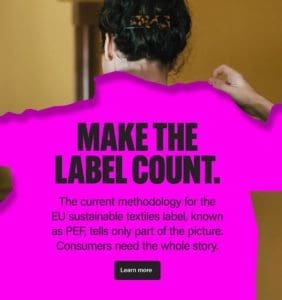Sustainability Labels Must Be Accurate and Complete if They Are to Drive Green Goals
Mandatory sustainability labelling for clothing and footwear is on the table as part of the European Union’s shift to a climate neutral and circular economy. But problems with how sustainability is measured risk a loss of credibility with consumers.
Inspired by successful examples in other sectors, the EU’s intent is to offer consumers information about the green credentials of clothes and shoes at point of purchase. This would in turn encourage brands and retailers to offer products that are designed to be more energy-efficient, durable, reusable, repairable and recyclable.
Currently, however, the way sustainability is counted makes it impossible for natural fibres to receive a positive score.
Make the Label Count
“A credible sustainability label has the potential to make the industry greener and empower EU consumers to make informed choices,” says Dalena White, Secretary General of the International Wool Textile Organisation (IWTO) and Co-Spokesperson for Make the Label Count campaign, along with Livia Firth of Eco-Age.
“We are very excited that the textile industry will be regulated in the near future and that proposed legislation will assist concerned consumers to make responsible decisions.
“EU policy makers have a crucial role to play in ensuring that labelling is supported by a system that presents a level playing field for all fibres by considering the full impacts of each garment’s life cycle.”
Where We Need to Measure Up
As it stands today, sustainability labelling does not account for crucial environmental impacts that sit at the forefront of EU policy:
The adverse effects of microplastic pollution, a known side effect of wearing and washing synthetic clothing, is absent from the scoring.
While all garments shed microfibres through laundering and daily wear, only synthetic garments made from fossil fuels discharge microplastic fibres. Microplastic pollution contaminates both terrestrial and marine environments and has entered the food chain. Scientific studies have shown that one typical 5-kilogram wash of fossil fuel-based garments can release as many as 6 million microplastic fibres.
The full environmental cost of fossil fuels is omitted from the scoring.
Accounting for synthetic fibres commences at extraction at the well-head, rather than the raw material formation. This leaves out all the impacts from the formation of the base material of synthetic fibres, crude oil. These impacts include greenhouse gas emissions, land use and water use.
Conversely, accounting for natural fibres begins with their formation on the farm, and all of those impacts are included in the scoring.
At a time when many industries are recognizing the impacts of and moving away from fossil fuels, the full environmental impacts of the formation of crude oil must be accounted for in this context.
Read more on POLITICO Europe: A question of credibility — the EU’s green transition for textiles
Circular and Social
True sustainability means products are made from renewable raw materials.
The circular attributes of natural fibres, such as renewability at the start-of-life, high levels of reuse and recycling during life, and biodegradability at end-of-life are not counted or only minimally counted in the current system of scoring.
Another obvious omission is the consideration of social impacts throughout the supply chain.
Make the Label Count – Campaign Launch
The Make the Label Count Campaign brings together an international coalition of organisations in an appeal for credibility in sustainability labelling for clothing. Learn more at www.makethelabelcount.org
Register here to join the campaign launch on 13 October, 11:00-13:00 CEST in Brussels and online.
The Make the Label Count Campaign brings together an international coalition of organisations in an appeal for credibility in sustainability labelling for clothing. Learn more at www.makethelabelcount.org
Register here to join the campaign launch on 13 October, 11:00-13:00 CEST in Brussels and online.

